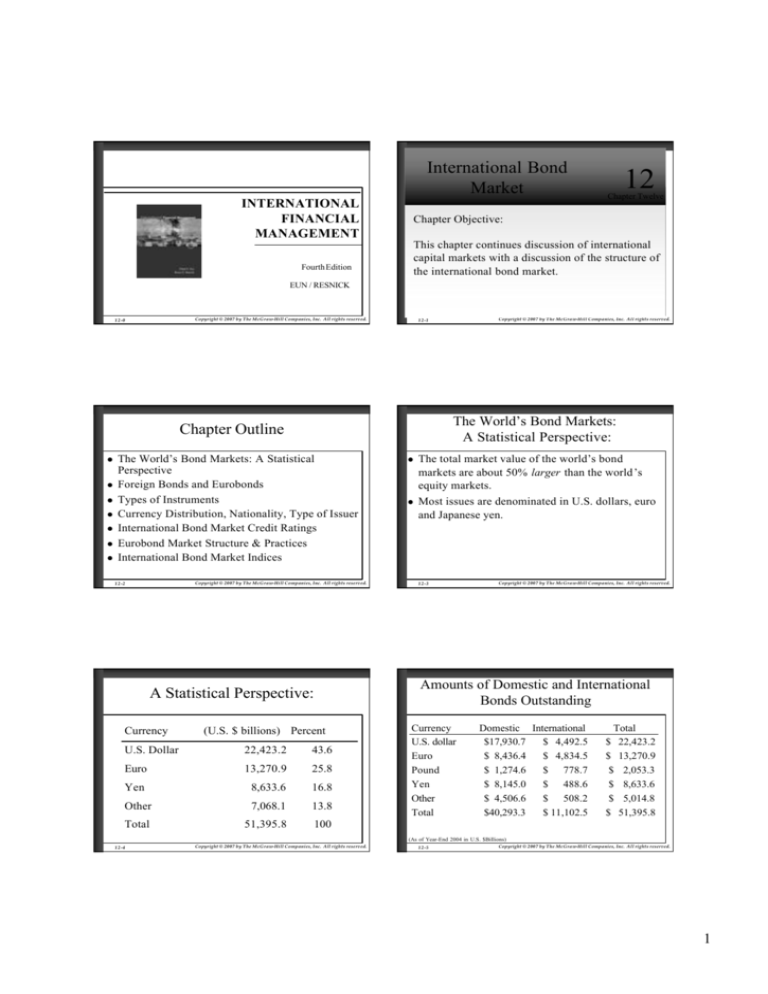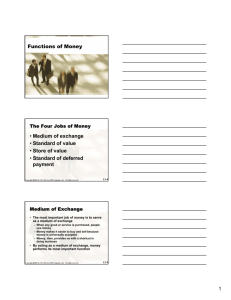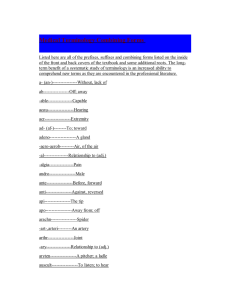
International Bond
Market
INTERNATIONAL
FINANCIAL
MANAGEMENT
Chapter Objective:
INTERNATIONAL
FINANCIAL
MANAGEMENT
This chapter continues discussion of international
capital markets with a discussion of the structure of
Fourth Edition
the international bond market.
Fourth Edition
EUN / RESNICK
EUN / RESNICK
Copyright © 2007 by The McGraw-Hill Companies, Inc. All rights reserved.
12-0
l
l
l
l
l
l
The World’s Bond Markets:
A Statistical Perspective:
The World’s Bond Markets: A Statistical
Perspective
Foreign Bonds and Eurobonds
Types of Instruments
Currency Distribution, Nationality, Type of Issuer
International Bond Market Credit Ratings
Eurobond Market Structure & Practices
International Bond Market Indices
Copyright © 2007 by The McGraw-Hill Companies, Inc. All rights reserved.
12-2
A Statistical Perspective:
Currency
Copyright © 2007 by The McGraw-Hill Companies, Inc. All rights reserved.
12-1
Chapter Outline
l
12
Chapter Twelve
(U.S. $ billions) Percent
U.S. Dollar
22,423.2
43.6
Euro
13,270.9
25.8
Yen
8,633.6
16.8
Other
7,068.1
13.8
Total
51,395.8
100
l
l
The total market value of the world’s bond
markets are about 50% larger than the world’s
equity markets.
Most issues are denominated in U.S. dollars, euro
and Japanese yen.
12-3
Copyright © 2007 by The McGraw-Hill Companies, Inc. All rights reserved.
Amounts of Domestic and International
Bonds Outstanding
Currency
U.S. dollar
Euro
Pound
Yen
Other
Total
Domestic International
$17,930.7
$ 4,492.5
$ 8,436.4
$ 4,834.5
$ 1,274.6
$ 778.7
$ 8,145.0
$ 488.6
$ 4,506.6
$ 508.2
$40,293.3
$ 11,102.5
Total
$ 22,423.2
$ 13,270.9
$ 2,053.3
$ 8,633.6
$ 5,014.8
$ 51,395.8
(As of Year-End 2004 in U.S. $Billions)
12-4
Copyright © 2007 by The McGraw-Hill Companies, Inc. All rights reserved.
12-5
Copyright © 2007 by The McGraw-Hill Companies, Inc. All rights reserved.
1
Amounts of Domestic and International
Bonds Outstanding
Domestic and International Bonds
Outstanding
50.0%
$50,000.0
45.0%
$40,000.0
40.0%
35.0%
Domestic
$30,000.0
$20,000.0
30.0%
25.0%
Domestic
International
Total
20.0%
Total
15.0%
10.0%
$10,000.0
5.0%
0.0%
$U.S.
dollar
12-6
Euro
Pound
Yen
Other
Total
U.S.
dollar
(As of Year-End 2004 in U.S. $Billions)
Copyright © 2007 by The McGraw-Hill Companies, Inc. All rights reserved.
12-7
l
l
l
l
Bearer Bonds and Registered Bonds
National Security Registrations
Withholding Taxes
Recent Regulatory Changes
Global Bonds
12-8
l
l
l
Copyright © 2007 by The McGraw-Hill Companies, Inc. All rights reserved.
l
l
l
Yankee bonds must meet the requirements of the
SEC, just like U.S. domestic bonds.
Many borrowers find this level of regulation
burdensome and prefer to raise U.S. dollars in the
Eurobond market.
Eurobonds sold in the primary market in the
United States may not be sold to U.S. citizens.
Of course, a U.S. citizen could buy a Eurobond on
the secondary market.
12-10
Copyright © 2007 by The McGraw-Hill Companies, Inc. All rights reserved.
Pound
Yen
Other
(As of Year-End 2004 in U.S. $Billions)
Copyright © 2007 by The McGraw-Hill Companies, Inc. All rights reserved.
Bearer Bonds are bonds with no registered owner.
As such they offer anonymity but they also offer
the same risk of loss as currency.
Registered Bonds: the owners name is registered
with the issuer.
U.S. security laws require Yankee bonds sold to
U.S. citizens to be registered.
12-9
National Security Registrations
l
Euro
Bearer Bonds and
Registered Bonds
Foreign Bonds and Eurobonds
l
International
Copyright © 2007 by The McGraw-Hill Companies, Inc. All rights reserved.
Withholding Taxes
l
l
l
Prior to 1984, the United States required a 30
percent withholding tax on interest paid to
nonresidents who held U.S. government or U.S.
corporate bonds.
The repeal of this tax led to a substantial shift in
the relative yields on U.S. government and
Eurodollar bonds.
This lends credence to the notion that market
participants react to tax code changes.
12-11
Copyright © 2007 by The McGraw-Hill Companies, Inc. All rights reserved.
2
Recent Regulatory Changes
l
Shelf Registration (SEC Rule 415)
n
l
n
l
Allows the issuer to preregister a securities issue, and
then offer the securities when the financing is actually
needed.
SEC Rule 144A
n
Global Bonds
l
Allows qualified institutional investors to trade private
placements.
These issues do not have to meet the strict information
disclosure requirements of publicly traded issues.
12-12
Copyright © 2007 by The McGraw-Hill Companies, Inc. All rights reserved.
A global bond is a very large international bond
offering by a single borrower that is
simultaneously sold in North America, Europe
and Asia.
Global bonds denominated in U.S. dollars and
issued by U.S. corporations trade as Eurobonds
overseas and domestic bonds in the U.S.
Types of Instruments
l
l
l
l
l
l
Straight Fixed Rate Debt
Floating-Rate Notes
Equity-Related Bonds
Zero Coupon Bonds
Dual-Currency Bonds
Composite Currency Bonds
12-14
Straight Fixed Rate Debt
l
l
l
Copyright © 2007 by The McGraw-Hill Companies, Inc. All rights reserved.
These are “plain vanilla” bonds with a specified
coupon rate and maturity and no options attached.
Since most Eurobonds are bearer bonds, coupon
dates tend to be annual rather than semi-annual.
The vast majority of new international bond
offerings are straight fixed-rate issues.
l
l
Just like an adjustable rate mortgage.
Common reference rates are 3-month and 6-month
U.S. dollar LIBOR
Since FRN reset every 6 or 12 months, the
premium or discount is usually quite small
Equity-Related Bonds
l
Convertibles
n
l
12-16
Copyright © 2007 by The McGraw-Hill Companies, Inc. All rights reserved.
Convertible bonds allow the holder to surrender his
bond in exchange for a specified number of shares in
the firm of the issuer.
Bonds with equity warrants
n
…as long as there is no change in the default risk.
Copyright © 2007 by The McGraw-Hill Companies, Inc. All rights reserved.
12-15
Floating-Rate Notes
l
Copyright © 2007 by The McGraw-Hill Companies, Inc. All rights reserved.
12-13
These bonds allow the holder to keep his bond but still
buy a specified number of shares in the firm of the
issuer at a specified price.
12-17
Copyright © 2007 by The McGraw-Hill Companies, Inc. All rights reserved.
3
Zero Coupon Bonds
l
l
l
Zeros are sold at a large discount from face value
because there is no cash flow until maturity.
In the U.S., investors in zeros owe taxes on the
“imputed income” represented by the increase in
present value each year, while in Japan, the gain is
a tax-free capital gain.
Pricing is very straightforward:
Dual-Currency Bonds
A straight fixed-rate bond, with
interest paid in one currency, and
principal in another currency.
l Japanese firms have been big issuers with coupons
in yen and principal in dollars.
l Good option for a MNC financing a foreign
subsidiary.
l
PAR
PV = (1 + r) T
Copyright © 2007 by The McGraw-Hill Companies, Inc. All rights reserved.
12-18
Composite Currency Bonds
l
l
l
Denominated in a currency basket, like the SDRs
or ECUs instead of a single currency.
Often called currency cocktail bonds.
Typically straight fixed rate debt.
Copyright © 2007 by The McGraw-Hill Companies, Inc. All rights reserved.
12-20
Currency Distribution of
International Bond Offerings
Currency
2003
U.S. dollar
51%
Euro
32
Yen
6
Pound Sterling
7
Swiss franc
2
Other
2
Total
100
(As of Year-End 2003 in U.S. $Billions)
12-22
Copyright © 2007 by The McGraw-Hill Companies, Inc. All rights reserved.
Copyright © 2007 by The McGraw-Hill Companies, Inc. All rights reserved.
12-19
Characteristics of International Bond
Market Instruments
Instrument
Frequency of
Payment
Size of
Coupon
Payoff at
Maturity
Straight Fixed-Rate
Annual
Fixed
Currency of issue
Floating Rate Note
Every 3 or 6 months
Variable
Currency of issue
Convertible Bond
Annual
Fixed
Straight fixed rate
with equity
warrants
Zero
Annual
Fixed
none
zero
Currency of issue
or conversion to
equity shares.
Currency of issue
plus conversion to
equity shares.
Currency of issue
Dual Currency
Bond
Annual
Fixed
Dual currency
12-21
Copyright © 2007 by The McGraw-Hill Companies, Inc. All rights reserved.
Distribution of International Bond
Offerings by Nationality
U.S. $B
12-23
Nationality
Australia
Canada
France
Germany
Italy
Japan
Netherlands
United Kingdom
United States
Total
2003
162
267.2
700.8
1,810.3
510.5
255.5
532.8
1,032.1
3,011.8
11,102.5
Copyright © 2007 by The McGraw-Hill Companies, Inc. All rights reserved.
4
Distribution of International Bond
Offerings by Type of Issuer
Type of Issuer
2003
Governments
1,122.3
Financial Institutions
8,032.5
Corporate issuers
1,446.6
International
organizations
Total
International Bond Market
Credit Ratings
l
l
l
Fitch IBCA, Moody’s and Standard & Poor’s
sell credit rating analysis.
Focus on default risk, not exchange rate risk.
Assessing sovereign debt focuses on political
risk and economic risk.
501.1
11,102.5
(As of Year-End 2003 in U.S. $Billions)
Copyright © 2007 by The McGraw-Hill Companies, Inc. All rights reserved.
12-24
12-25
Eurobond Market Structure
l
Primary Market
n
l
n
l
OTC market centered in London.
uComprised of market makers as well as brokers.
uMarket
makers and brokers are members of the International
Securities Market Association (ISMA).
l
Clearing Procedures
n
International Bond Market Indices
Very similar to U.S. underwriting.
Secondary Market
Copyright © 2007 by The McGraw-Hill Companies, Inc. All rights reserved.
l
There are several international bond market
indices.
J.P. Morgan and Company
n
n
n
n
Domestic Bond Indices
International Government bond index for 18 countries.
Widely referenced and often used as a benchmark.
Appears daily in The Wall Street Journal
Euroclear and Cedel handle most Eurobond trades.
12-26
Copyright © 2007 by The McGraw-Hill Companies, Inc. All rights reserved.
12-27
Copyright © 2007 by The McGraw-Hill Companies, Inc. All rights reserved.
End Chapter Twelve
INTERNATIONAL
FINANCIAL
MANAGEMENT
Fourth Edition
EUN / RESNICK
12-28
Copyright © 2007 by The McGraw-Hill Companies, Inc. All rights reserved.
12-29
Copyright © 2007 by The McGraw-Hill Companies, Inc. All rights reserved.
5
International Equity
Markets
Chapter Objective:
13
Chapter Thirteen
INTERNATIONAL
FINANCIAL
MANAGEMENT
This chapter discusses both the primary and
secondary equity markets throughout the world.
Fourth Edition
EUN / RESNICK
Chapter Outline
l
l
l
l
l
l
l
l
l
l
l
Copyright © 2007 by The McGraw-Hill Companies, Inc. All rights reserved.
12-30
A Statistical Perspective
n Market
Capitalization
of Developed
Countries
Market
Structure,
Trading
Practices,
and Costs
n Market Capitalization of Developing Countries
International
Equity Market Benchmarks
n Measures of Liquidity
inShares
MSCI
Measures of Market Concentration
Trading
in International
Equities
Market Structure,
Trading
Practices, and Costs
n Magnitude
of International
Equity Equity
Trading Returns
Factors
Affecting
International
International Equity Market Benchmarks
n
12-31
l
l
l
Market Capitalization of Developed Countries
Market Capitalization of Developing Countries
Measures of Liquidity
Measures of Market Concentration
l
Copyright © 2007 by The McGraw-Hill Companies, Inc. All rights reserved.
12-32
Almost 90% of the total market capitalization of
the world’s equity markets is accounted for by the
market capitalization of the developed world.
12-33
Market Capitalization of
Developing Countries
l
The other 10% is accounted for by the market
capitalization of developing countries in
“emerging markets”.
n
n
n
n
l
Latin America
Asia
Eastern Europe
Mideast/Africa
12-34
Copyright © 2007 by The McGraw-Hill Companies, Inc. All rights reserved.
Copyright © 2007 by The McGraw-Hill Companies, Inc. All rights reserved.
Measures of Liquidity
l
The equity markets of the developed world tend to
be much more liquid than emerging markets.
n
l
Recently the growth rates in these emerging
markets have been strong, but with more volatility
than we have here at home.
Copyright © 2007 by The McGraw-Hill Companies, Inc. All rights reserved.
Market Capitalization of Developed
Countries
A Statistical Perspective
l
Cross-Listing of Shares
inShares
YankeeMSCI
Stock Offerings
Trading
n The European
in International
Stock Market
Equities
n American
Depository
Receipts
Factors
Affecting
International
Equity Returns
Liquidity refers to how quickly an asset can be sold
without a major price concession.
So, while investments in emerging markets may
be profitable, the focus should be on the long
term.
12-35
Copyright © 2007 by The McGraw-Hill Companies, Inc. All rights reserved.
6
Market Structure,
Trading Practices, and Costs
Measures of Market Concentration
l
Emerging Markets tend to be much more
concentrated than our markets.
n
l
l
Primary Markets
n
Concentrated in relatively few companies.
That is, a few issues account for a much larger
percentage of the overall market capitalization in
emerging markets than in the equity markets of
the developed world.
l
Secondary Markets
n
Copyright © 2007 by The McGraw-Hill Companies, Inc. All rights reserved.
12-36
Shares offered for sale directly from the issuing
company.
Provide market participants with marketability and
share valuation.
Market Structure,
Trading Practices, and Costs
l
Market Order
n
l
n
l
Market Structure,
Trading Practices, and Costs
l
Dealer Market
n
An order to your broker to buy or sell share
immediately at the market price.
n
Limit Order
An order to your broker to buy or sell at the at a price
you want, when and if he can.
If immediate execution is more important than the
price, use a market order.
l
Auction Market
n
l
The stock is sold by dealers, who stand ready to buy
and sell the security for their own account.
In the U.S., the OTC market is a dealer market.
Organized exchanges have specialists who match buy
and sell orders. Buy and sell orders may get matched
without the specialist buying and selling as a dealer.
Automated Exchanges
n
12-38
Copyright © 2007 by The McGraw-Hill Companies, Inc. All rights reserved.
l
l
Computers match buy and sell orders.
Copyright © 2007 by The McGraw-Hill Companies, Inc. All rights reserved.
12-39
North American Equity Market
Benchmarks
International Equity Market
Benchmarks
l
Copyright © 2007 by The McGraw-Hill Companies, Inc. All rights reserved.
12-37
North America
Europe
Asia/Pacific Rim
NAME
SYMBOL
Dow Jones Industrial Average
DJIA
NASDAQ Combined
Composite
S&P 500
CCMP
TSE 300
TS300
Mexico BOLSA Index
12-40
Copyright © 2007 by The McGraw-Hill Companies, Inc. All rights reserved.
12-41
SPX
MEXBOL
Copyright © 2007 by The McGraw-Hill Companies, Inc. All rights reserved.
7
Asia/ Pacific Rim Equity Market
Benchmarks
European Equity Market Benchmarks
NAME
NAME
FT-SE 100
UKX
NIKKEI 225 Index
NKY
CAC
Hang Seng Index
HSI
Frankfurt DAX Index
DAX
Sing Straits Times Index
STI
IBEX Index
IBEX
ASX All Ordinaries Index
AS300
Milan MIB30
MIB30
BEL20
Copyright © 2007 by The McGraw-Hill Companies, Inc. All rights reserved.
12-43
i Shares MSCI
l
l
Country-specific baskets of stocks designed to
replicate the country indexes of 21 countries.
i Shares are exchange traded funds that trade on
the American Stock Exchange and are subject to
U.S. SEC and IRS diversification requirements.
n
Low cost, convenient way for investors to hold
diversified investments in several different countries.
12-44
l
l
l
l
l
Copyright © 2007 by The McGraw-Hill Companies, Inc. All rights reserved.
l
During the 1980s world capital markets began a
trend toward greater global integration.
Diversification, reduced regulation, improvements
in computer and communications technology,
increased demand from MNCs for global
issuance.
12-46
Copyright © 2007 by The McGraw-Hill Companies, Inc. All rights reserved.
Copyright © 2007 by The McGraw-Hill Companies, Inc. All rights reserved.
Trading in International Equities
Magnitude of International Equity Trading
Cross-Listing of Shares
Yankee Stock Offerings
The European Stock Market
American Depository Receipts
12-45
Magnitude of International
Equity Trading
l
SYMBOL
CAC 40
BEL20 Index
12-42
SYMBOL
Copyright © 2007 by The McGraw-Hill Companies, Inc. All rights reserved.
Cross-Listing of Shares
l
l
Cross-Listing refers to a firm having its equity
shares listed on one or more foreign exchanges.
The number of firms doing this has exploded in
recent years.
12-47
Copyright © 2007 by The McGraw-Hill Companies, Inc. All rights reserved.
8
Advantages of Cross-Listing
l
It expands the investor base for a firm.
n
l
l
l
Yankee Stock Offerings
l
Very important reason for firms from emerging market
countries with limited capital markets.
n
Establishes name recognition for the firm in new
capital markets, paving the way for new issues.
May offer marketing advantages.
May mitigate possibility of hostile takeovers.
12-48
The direct sale of new equity capital to U.S.
public investors by foreign firms.
n
Copyright © 2007 by The McGraw-Hill Companies, Inc. All rights reserved.
Privatization in South America and Eastern Europe
Equity sales by Mexican firms trying to cash in on
NAFTA
12-49
The European Stock Market
l
l
There is not as yet a single European stock market
that comprises all national markets.
A lack of common securities regulations, even
among the countries of the European Union, is
hindering this development.
12-50
American Depository Receipts
l
l
l
Copyright © 2007 by The McGraw-Hill Companies, Inc. All rights reserved.
Foreign stocks often trade on U.S. exchanges as
ADRs.
It is a receipt that represents the number of foreign
shares that are deposited at a U.S. bank.
The bank serves as a transfer agent for the ADRs
12-51
American Depository Receipts
l
There are many advantages to trading ADRs as
opposed to direct investment in the company’s
shares:
n
n
n
ADRs are denominated in U.S. dollars, trade on U.S.
exchanges and can be bought through any broker.
Dividends are paid in U.S. dollars.
Most underlying stocks are bearer securities, the ADRs
are registered.
12-52
Copyright © 2007 by The McGraw-Hill Companies, Inc. All rights reserved.
Copyright © 2007 by The McGraw-Hill Companies, Inc. All rights reserved.
Copyright © 2007 by The McGraw-Hill Companies, Inc. All rights reserved.
Volvo ADR
l
l
A good example of a familiar firm that trades in a
U.S. as an ADR is Volvo AB, the Swedish car
maker.
Volvo trades in the U.S. on the NASDAQ under
the ticker VOLVY.
n
n
l
The depository institution is JPMorgan ADR Group.
The custodian is a Swedish firm, S E Banken Custody.
Of course, Volvo also trades on the Stockholm
Stock Exchange under the ticker VOLVB.
12-53
Copyright © 2007 by The McGraw-Hill Companies, Inc. All rights reserved.
9
Factors Affecting
International Equity Returns
Global Registered Shares
l
l
l
l
DaimlerChrysler AG is a German firm, whose
stock trades as a GRS.
GRS are one share traded globally, unlike ADRs,
which are receipts for banks’ deposits of homemarket shares and traded on foreign markets.
They trade in both dollars and euros.
All shareholders have equal status and voting
rights.
12-54
l
l
l
Copyright © 2007 by The McGraw-Hill Companies, Inc. All rights reserved.
Macroeconomic Factors
Exchange Rates
Industrial Structure
12-55
Macroeconomic Factors Affecting
International Equity Returns
l
l
The data do not support the notion that equity
returns are strongly influenced by macro factors.
That is correspondent with findings for U.S.
equity markets.
12-56
Copyright © 2007 by The McGraw-Hill Companies, Inc. All rights reserved.
Exchange Rates
l
l
Exchange rate movements in a given country
appear to reinforce the stock market movements
within that country.
One should be careful not to confuse correlation
with causality.
12-57
Industrial Structure
l
Copyright © 2007 by The McGraw-Hill Companies, Inc. All rights reserved.
Copyright © 2007 by The McGraw-Hill Companies, Inc. All rights reserved.
End Chapter Thirteen
Studies examining the influence of industrial
structure on foreign equity returns are
inconclusive.
12-58
Copyright © 2007 by The McGraw-Hill Companies, Inc. All rights reserved.
12-59
Copyright © 2007 by The McGraw-Hill Companies, Inc. All rights reserved.
10








